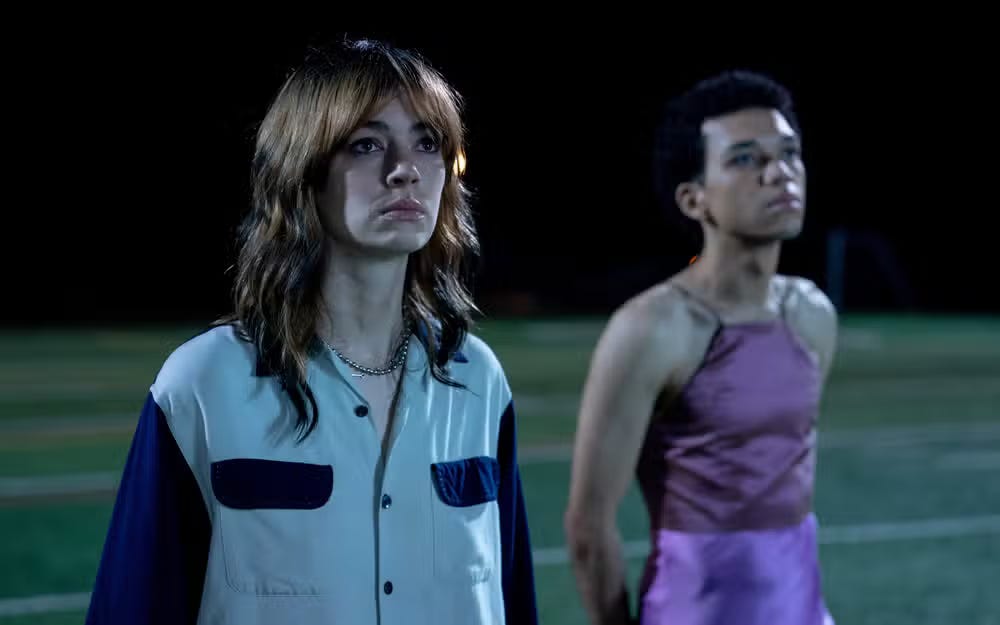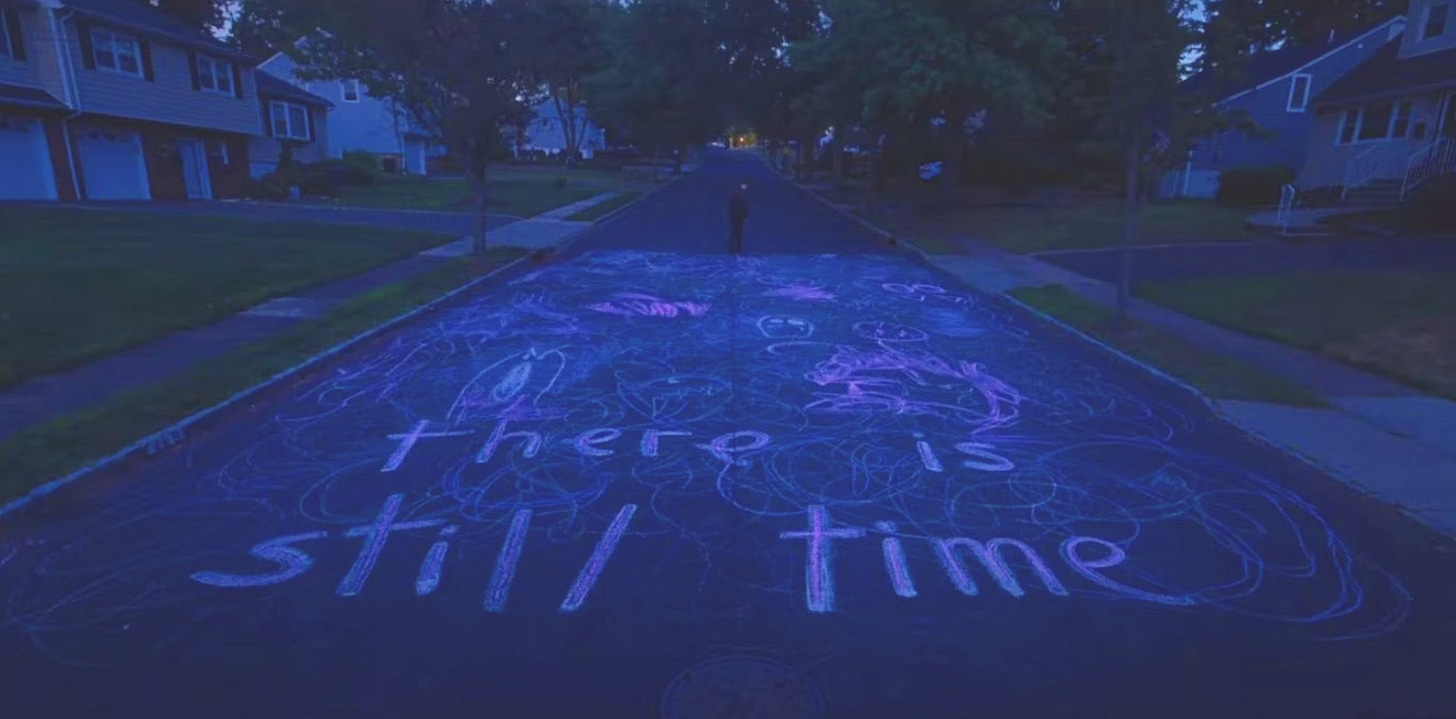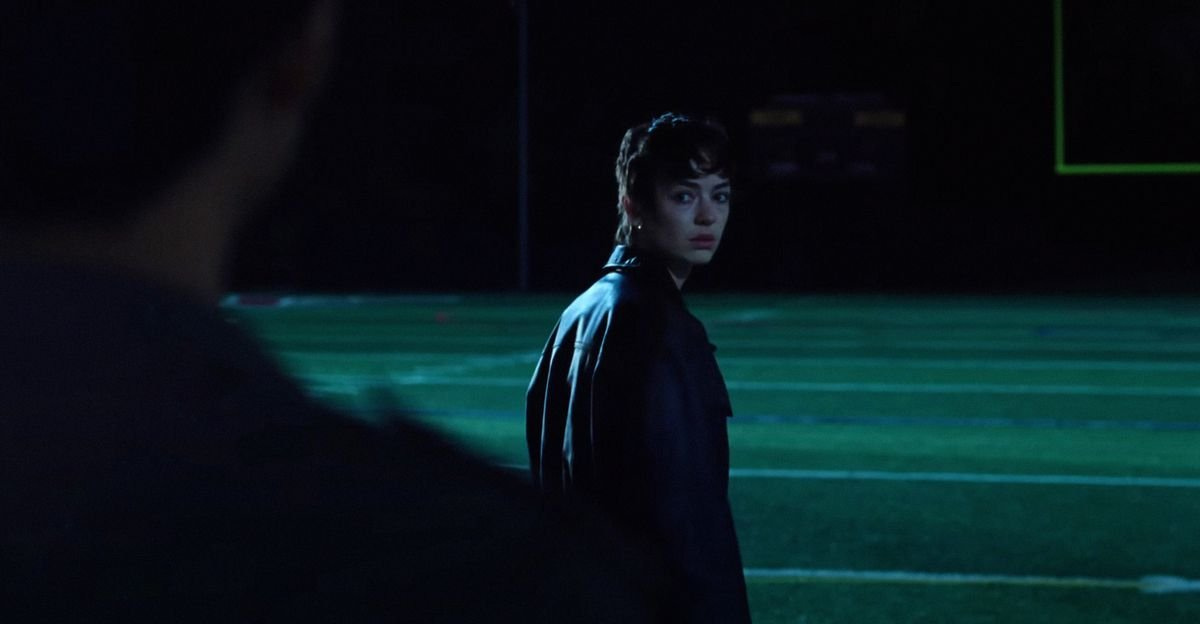The first time I watched I Saw the TV Glow, I went in without really knowing much about the themes. I just knew it was a campy A24 movie with queer themes, and I love anything related to exploring what television means. When I walked out of the movie theater, I wasn’t crying or sobbing like most trans or queer people. I left with a strange, unsettled sensation in my chest.
Over the next few days, I began reading articles and interviews about the movie, uncovering the hidden meanings and digesting everything. Suddenly, that unsettled feeling tangled up inside my body began to unfurl and curl into every part of my body, nestling inside a small space in all of its glory.
The first queer friends I ever had were in middle school. Much like in the movie, I was wearing some band merch, and one of my now close friends pointed it out, making a remark about how much they liked that band too. Slowly, over the course of 7th and 8th grade, I grew close to this group of friends, and though not all of us identified as queer at the time, all of us had something we were obsessed with.
Some of us were obsessed with Kpop, memorizing the names of every song by groups like Seventeen and their respective dances. Others were obsessed with animated shows. Me and my friend were obsessed with YouTube and TV Shows like Sherlock and The Good Place. These were also the first people to ever call me by my preferred name without even demanding an explanation for my name change.
Most of my queer friends have some sort of obsession that many non-queer people don’t have. Perceiving and obsessing over media is almost like an identifier, a little signal of queerness that often overlaps with neurodivergence. But even without the explanation of hyperfixation, I believe that so many queer people, like Maddy and Owen, often find meaning in the obscure because it helps us survive.
I’m fortunate to have grown up in a liberal place considered LGBTQ+-friendly. However, most of my friends and I were second-generation immigrant children of color, meaning that even if we could socially be out, none of us were really out to our family, considering most of them still held “traditional” cultural beliefs.
In the movie, Owen has to lie to his parents in order to watch the show The Pink Opaque. Similarly, most of my friends’ parents didn’t really approve of our obsessions. So, we would make up excuses, like throwing birthday parties at the mall so we could raid the Hot Topic for band merch or working on Geometry projects together to watch Dan and Phil videos after finishing our work.
Even now, whenever I watch shows like Gravity Falls or Adventure Time with my sister, my parents ask why we’re watching kids shows and what we possibly could see in the shows. This simple lack of understanding demonstrates the discrepancy between queer and non-queer people, showing that the way we navigate the world, the way we survive is fundamentally different.
In the first act of the movie, Maddy confesses, “Sometimes the Pink Opaque feels more real than my life.” This sentiment is reiterated throughout the movie as even at school, Owen and Maddy seem to be thinking about the Pink Opaque and perceiving the dimly lit halls with a pink glow.
While tons of people love Love, Simon, and Heartstopper for the way they present supportive high school communities, I loved how I Saw the TV Glow made high school seem like an empty space or even a threatening one where bodies are buried.
My friends from middle school all went to different high schools. Without a community to understand my obsessions with TV shows, I spent most of high school feeling lonely and isolated to the point where I felt grateful that I spent the entirety of my junior year remote so I could stay home and watch/rewatch shows like Silicon Valley, Veep, Doom Patrol, and What We Do in the Shadows.
This obsession with TV shows seeped into my life even as I returned to high school in person. I would discuss and rank my favorite sitcoms with another person in class who casually enjoyed sitcoms. I would discuss new episodes of It’s Always Sunny in Philadelphia with my statistics teacher, who was also a fan of the show.
It was the only way I could cope with the intense academic and athletic pressure I was dealing with. I barely had any friends, my home life was a mess, and school was hell. But at the end of the day, I knew that I could come home and watch my favorite sitcoms, mouthing along with my favorite scenes word for word.
Much like Maddy, I, too, had the belief that I needed to get out of my hometown and that I would die if I stayed. Much like Owen, I am afraid to disappear completely from my hometown. Even though I’ve discussed not feeling like I owe anything to people from my old life, that doesn’t mean that I can easily ignore the heavy guilt and complacency that slid back into the cardboard cut-out of life for me back home.
I wrote about this in a song titled “when i leave”: “Being loved is more important than being happy / And I have a habit of constantly hiding / Whatever I think you would absolutely despise / Because I’m terrified that you wouldn’t like / Me as I am, baby, you think you know about me / But you barely recognize my personality / I borrowed it from TV shows and the books that I read / The only things that I’m taking when I leave.”
I Saw the TV Glow is categorized as a horror movie, not necessarily because the idea of being trans and queer is what’s terrifying, but the idea that you’re not living up to your full potential, that the pain of denial is greater than the pain of acceptance, is something so viscerally relatable. I’ve known many people early on in my life who no longer identify as queer or trans, one of them being a girl who, at the time, was my best friend and who I was head-over-heels in love with.
The movie touches on the idea of queer temporality, the idea that queer people experience time differently from non-queer people. We reach milestones, such as having our first kiss or marriage, later than cishet people do. We live life on a different axis of time. Thus, complacency is much easier for people as living in denial guarantees that you won’t have to deal with living life where you feel like you’re constantly racing against the clock.
It’s a terrifying concept, especially when you’re young, to realize that you’re different from the majority of your peers. Even though being different isn’t necessarily bad, it can be a lonely experience, which I realize now as I reflect on how I never felt understood by others. It’s tempting to put off thinking about why you are the way you are until years pass and you realize there’s a pain inside you that almost feels suffocating.
Queerness and transness are beautiful. Some have seen the TV glow and buried themselves deep within their body, so deep that they don’t recognize themselves anymore. I’m grateful that I’ve seen the TV glow and have dug myself out from deep under the dirt, but there are days, especially when I’m home when I can feel myself sinking down again.
To Maddy and Owen, The Pink Opaque is more than just a show; it’s a method of survival and identity. To me, television shows will always be more than just media; it’s a method of survival, a way to keep myself grounded in the alternate reality I live in compared to the non-queer people I’m surrounded by.
In the movie, when Maddy runs away and begs Owen to join, Maddy still seems somewhat unsatisfied with life. From getting misgendered during daily interactions to coworkers making assumptions about your dating life, the mundane, casual horror of cis/heteronormative expectations never really goes away for trans and queer people.
You can see the TV glow, have pink washing over every corner of your memories, and still wonder if Mr. Melancholy has your body trapped in a freezer somewhere. You can still be your proud, queer and trans self and wonder if you are truly alive, living life to its maximum potential.
I haven’t returned to my high school since graduating, but when I remember the halls of A Building, where my locker was, I see a dark hallway lined with static. I walk alone down the walls, hearing the echoes of the person I hid deep inside me, begging to be freed, begging to run away into a television show where I wouldn’t be as confused or lonely as I am from the other end of the television screen.








This is beautiful. I haven’t personally watched this show..but I love the commentary on queer culture and how we can find survival through being able to relate to characters or themes that actually resonate with us, rather than the very distorting and common cis/hetero constructs that we constantly find ourselves in. I think TV then, like you said, is deeper than media, and is instead something that keeps the mind and your identity alive when it doesn’t seem to be found anywhere else around you. Really got me thinking. Peace
the geometry project <33 also i haven’t said this before but your substack is amazing i always enjoy reading them!!